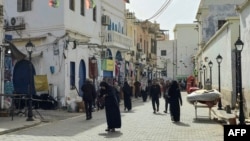Libya is divided between two rival governments: Prime Minister Abdul Hamid Dbeibeh’s internationally recognized Government of National Unity, which is based in Tripoli, and the Government of National Stability, led by Osama Hamada and supported by the Libyan House of Representatives and the Libyan National Army, which controls the eastern half of the country.
The country’s political crisis stems from the failure to hold elections on Dec. 24, 2021, and the refusal of Prime Minister Dbeibeh to step down. Since then, despite a general agreement regarding the necessity of elections, the parties disagree on proposed electoral legislation that would enable such elections which could unify the government.
Furthermore, both sides continue to take hostile unilateral actions that only serve to increase tension and insecurity even as they exacerbate the country’s rapid deterioration of political and economic stability.
“The status quo is not sustainable,” said Stephanie Koury, Deputy Special Representative and Officer-in-Charge of the UN Support Mission in Libya during her recent presentation of the Secretary-General’s report on Libya. “In the absence of renewed political talks leading to a unified government and elections, you see where this is heading - greater political financial and security instability, entrenched political and territorial divisions, and greater domestic and regional instability.”
“We echo the Secretary-General’s deep concern in his latest report about the political stalemate and risk of further political division sowing the seeds of possible conflict in Libya,” said Robert Wood, U.S. Alternative Representative for Special Political Affairs at the U.N.
“Recent unilateral political actions are not conducive to the dialogue required for a peaceful compromise that can reunify the country. Rather, it is imperative the parties negotiate their differences in the interest of national unity. We urge redoubled efforts towards this end.”
Ambassador Wood called for all actors within and outside Libya to support the UN Secretary-General’s efforts to define a credible roadmap toward free and fair national elections. “These, in turn, should lead to a representative and accountable government that the Libyan people need and deserve,” he said.
“Rising instability along Libya’s southern borders is a reminder of the importance of supporting the reunification of Libyan military and security institutions. Progress toward military unification would reaffirm Libyan sovereignty and help prevent Libya from becoming enmeshed in regional conflict.”
“We call on all Member States to adhere to Security Council resolutions urging full respect for the sovereignty, independence, territorial
integrity, and national unity of Libya.”














